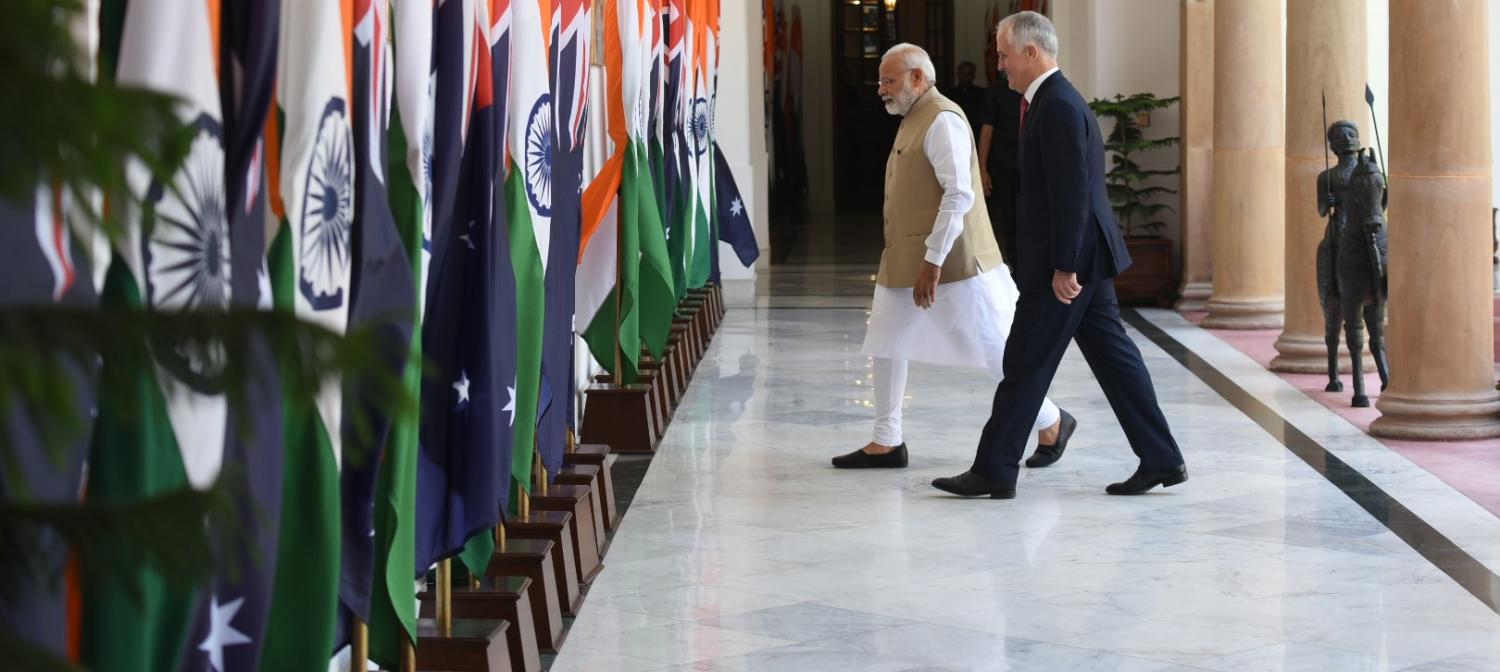Economics is likely to dominate the agenda during Malcolm Turnbull's visit to India this week, his first trip to New Delhi as prime minister. That makes sense. No longer the ‘sick man of Asia’, India has the world’s third-largest economy by the purchasing power parity standard of measurement, and has been growing faster than China since 2016.
While chasing the rupee, one hopes there is time set aside to pursue a strategic agenda. In addition to having the sixth-largest military budget in the world and one of the region’s most capable naval forces, India’s security interests are increasingly aligned with Australia’s.
This visit will be a perfect opportunity for Turnbull to promote the revival of the 2007 Quadrilateral Initiative, a fledging strategic grouping between Australia, India, Japan and the US agreed under the Howard Government and then abandoned by Kevin Rudd. Even if it was ahead of its time in 2007, the contemporary strategic logic of reviving the Quad is compelling.
In 2007, a credible case could be made that Beijing was sincere with respect to China’s self-proclaimed ‘peaceful rise’. A decade later, President Xi Jinping’s ‘China Dream’ encapsulates a confident and powerful China rewriting perceived historical wrongs – by, among other things, revising maritime boundaries and challenging aspects of international law – that has since superseded talk of its ‘peaceful rise’. Chinese activities in East and South China Seas are causing India unease as China's navy expands its presence in the Indian Ocean.
The China factor means impediments to reviving the Quad are smaller than before. This is important because Turnbull will not want to risk the embarrassment of being rebuffed by his host. Under Modi, the Quad idea is highly likely to receive a sympathetic hearing. Australia’s relationship with India is already on a much better footing, with the Rudd Government’s decision to ban uranium exports to India, and to unilaterally withdraw from the Quad, now distant memories.
In addition, India is steadily leaving behind its Cold-War non-alignment philosophy and is seeking ways to shape its strategic environment. The Indian leader has made unusually pointed remarks about the risks to economic development should China’s ‘expansionist mindset’ remain unchecked. New Delhi has deepened its strategic and defence partnerships with both the US and Japan considerably as part of India’s new multi-alignment strategy. Importantly, the multilateral nature of the Quad makes it an easier sell to the domestic Indian audience than would a bilateral agreement.
There are other benefits to Turnbull taking the lead on this issue. Japan places great importance on its relationship with India and will appreciate Australia taking steps to revive the Quad, which was pushed by Abe during his first short period as prime minister. Canberra’s initiative on promoting Abe’s pet project will help Australia and Japan put the divisive submarine issue behind them.
Australian advocacy for the Quad is also likely to play well with the Trump Administration. The US is under pressure to demonstrate the credibility of its alliance relationships in Asia while also persuading its allies and partners to do more heavy lifting. Foreign Minister Julie Bishop has gone to great efforts to publicly urge the new Administration to remain engaged in the region, most notably in speeches in Los Angeles and Singapore in January and March respectively.
Last week’s air strikes on Syrian government forces suggest President Trump may well be a refreshing change from Barack Obama in one respect: demonstrating that he is a can-do president prepared to act when the need arises. By encouraging India to revive the Quad, Turnbull is signaling to Washington that Australia is not sitting on its hands. Canberra is making the effort to be creative and proactive in bringing more players with similar interests into alignment.
Turnbull has referred to the US as the ‘irreplaceable anchor’ for peace and stability in Asia, matching Bishop’s view of Washington as the ‘indispensable power’ in the region. By reviving an institution within which the US can exercise leadership, Turnbull would put meat on the bones of that rhetoric. If Turnbull takes the plunge and is rewarded by Indian agreement, this will be the first step toward the Quad becoming an effective and sensible check against Chinese behaviour and the basis for genuinely meaningful strategic cooperation between the four countries.
The Quad is an idea whose time has arrived. Turnbull will enhance Australia’s standing among three important regional countries if the first early steps are taken this week.

